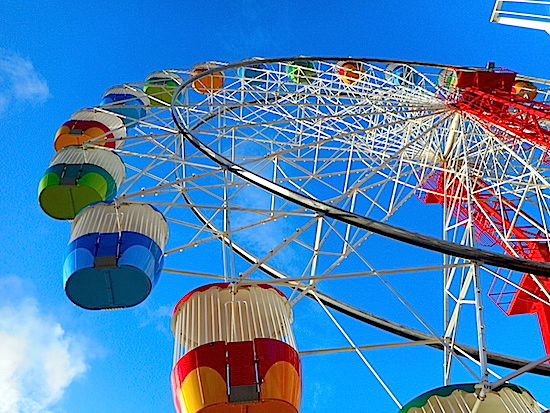Search
Recent comments
- letter from an E-C....
1 hour 26 min ago - reality....
3 hours 25 min ago - opening the world....
10 hours 18 min ago - UK wants WW3...
10 hours 38 min ago - the old deal....
11 hours 4 min ago - collapse....
12 hours 59 min ago - EU hypocrisy....
13 hours 7 min ago - anglo-aggression....
13 hours 54 min ago - subsidising doom....
14 hours 13 min ago - elite shits...
17 hours 17 min ago
Democracy Links
Member's Off-site Blogs
the spinning wheel of commerce has slowed...
 wheelFrom bikes to booze, the global supply chain is on its knees
wheelFrom bikes to booze, the global supply chain is on its knees
The integration of the global supply chain has served the world well for years. However, it’s now under pressure just as the economy recovers.
By Shane Wright and Nick Bonyhady
Before a new bicycle hits the road or a mountain trail, it has usually already travelled thousands of kilometres.
A high-end road bike might be made in Taiwan, with brakes from Japan, a carbon frame from Vietnam, tyres from Germany and gears from mainland China.
Those wanting something special might choose a model with an electric motor, making it reliant on semiconductors that could come from South Korea.
This combination might deliver the best bicycle, but the buyer will be in for a long wait.
The biggest test of the world’s global supply chain, set in train by the COVID-19 pandemic, is now threatening to end hopes of a day on the trails, bring the international economy to its knees and push up inflation that may drive up official interest rates.
“It’s hard to explain to someone who just wants to buy their 10-year-old a bike, let alone themselves,” says Sydney cycle store owner Michael Kamahl.
Mr Kamahl, who has been in the bike trade so long that he has only the remnants of the 1970s hairstyle that gave his inner-Sydney store Wooly’s Wheels its name, has never seen the market like this.
Stuart Armstrong, of Melbourne bike shop Velo Cycles, is in a similar position, with gaps in his usual range but some in stock as savvy customers prepare for Christmas early.
“Inevitably it’s the wrong size or wrong colour for someone who wants to buy the bike,” he says ruefully.
That’s just to order a bike. Paying for it has not got any easier either.
“You can only fit so many [bikes] in a container,” says Phil Latz, founder of trade publication Micromobility Report. “The unit price has gone from, say, $12 to $50. That’s a significant increase and someone has to pay for that.”
While that may not make a huge difference to the overall cost of a $10,000 carbon-fibre racer, it’s a big jump in the cost of a $300 discount fixed-gear.
Store prices have already risen between 5 and 12 per cent, Mr Latz said, with traditional seasonal discounting all but wiped out and further rises on the horizon.
Read more:
FREE JULIAN ASSANGE NOW !!!!!!!!!!!!!!!!
- By Gus Leonisky at 25 Oct 2021 - 7:08am
- Gus Leonisky's blog
- Login or register to post comments
the noble container...
If you were to rank humanity's most consequential inventions, chances are the shipping container wouldn't rate a mention.
This bland metallic box could never compete with the likes of the wheel, Gutenberg's printing press or the internet, right?
Wrong, according to Anna Nagurney, an operations management expert at the University of Massachusetts.
"Without this brilliant invention … we wouldn't have global supply chains, we wouldn't have global trade at the level that we have now," Professor Nagurney tells ABC RN's Late Night Live.
And amid an international supply chain crisis, with a growing backlog of delayed orders and labour shortages across networks, the importance of these bland metallic boxes has never been more apparent.
Almost every product travels in a shipping containerIn most Australian homes and just about any other venue you can think of, the majority of the items there likely arrived via a shipping container.
This probably includes the clothes you're wearing, the device this article is appearing on and the coffee you may have just drunk.
"About 90 per cent of the world's goods are transported via ships," Professor Nagurney says, and most of this is inside shipping containers.
She says around US$14 trillion ($18.8 trillion) worth of goods cross the seas each year inside one of these units.
But COVID-19 has upended the global networks that supply most of what we consume and own.
The struggle to find shipping containersVinh Thai, a shipping and logistics expert at RMIT University and the founder of the Australian Maritime Logistics Research Network, says the trouble began early last year.
"[Initially], national lockdowns and restrictions saw demand for goods actually reduce a lot … So ships would skip a port in a route or sometimes skip the whole voyage," Professor Thai says.
Read more: https://www.abc.net.au/news/2021-10-29/what-is-the-great-shipping-container-shortage-covid-christmas/100550198
FREE JULIAN ASSANGE NOWWWWWWWWWW!!!!